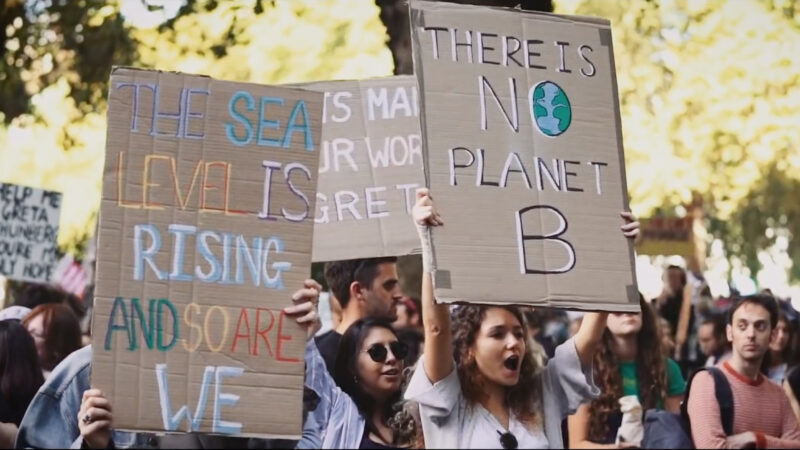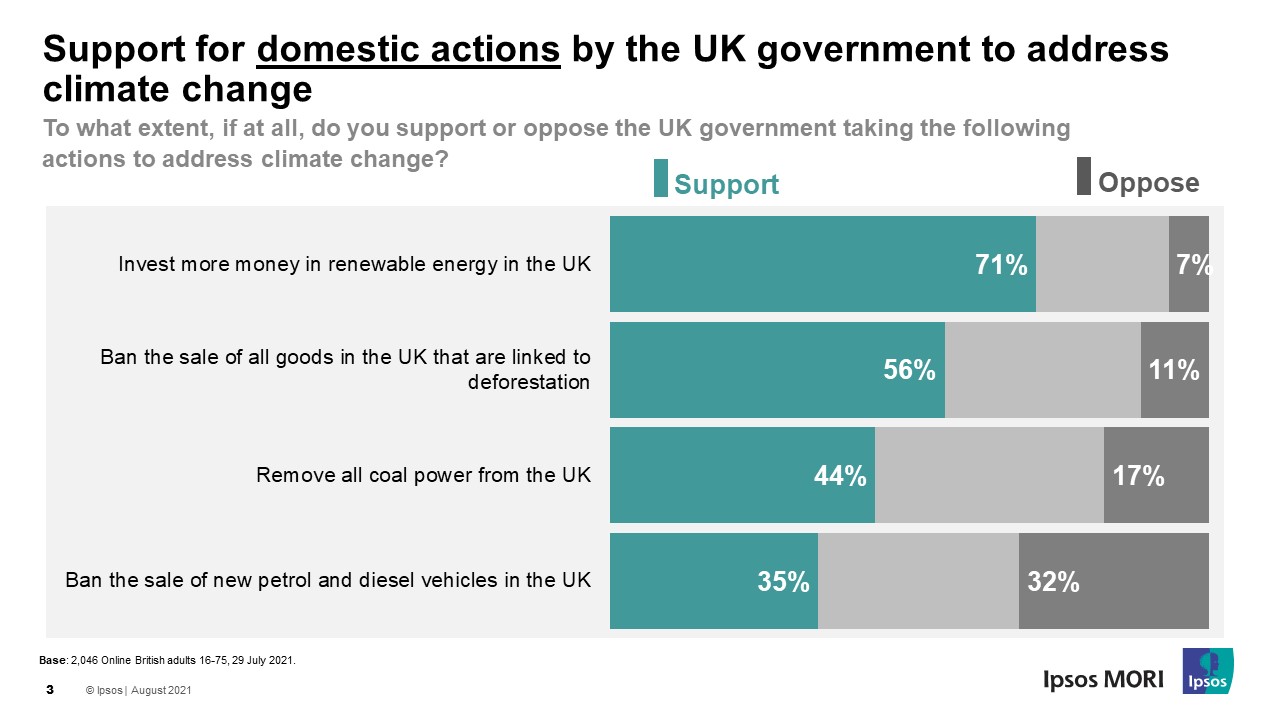
Polling suggests politicians not seen to be doing enough on climate change face an increasing uphill battle, as there are few ‘climate sceptics’ across either party or Brexit-voting lines. Opinium research found a majority of Conservative (53%), Labour (75%), Remain (77%) and Leave (50%) voters think that “man-made climate change is a real issue, and it is as bad as often described”. Just 8%, 6%, 4% and 11% respectively thought it was “not a real issue”.
More worrying for Boris Johnson, a large chunk of voters across all groups believe that the government is underreacting. This is highest among Labour voters at 66% and Remain voters at 64%, but a significant section of Leave voters (28%) and Tory voters (24%) agree. According to YouGov, the environment now ranks as the third most important issue facing the country, up six points from June 7th to 34% on August 9th. It comes behind only health and the economy. It ranks ahead of immigration, Brexit, crime and immigration. For 18- to 24-year-olds, it is the most important issue.
71% think the government should invest more in renewable energy in the UK, according to Ipsos Mori, compared to just 7% against. 44% want to see the removal of coal power from the country, while just 17% oppose the measure. 60% support a ban on imports linked to deforestation and 58% say the government should use its diplomatic influence to increase its emission reduction targets. A majority also want to see the UK reduce emissions at a faster pace than other countries to set an example (56%), restrict trade with countries who do not commit to international climate targets (53%) and end investment in oil, coal and gas projects abroad (51%).

Johnson has committed to reducing greenhouse gas emissions by at least 68% by 2030. Support is reasonably high for the Prime Minister’s approach. According to Ipsos Mori, 42% currently believe this is “about right”, while 17% think it is “not ambitious enough”. 25% told researchers it is “too ambitious” and just 4% describe the commitment as “not necessary”. But as the crisis worsens and climate issues continue to trend upwards on the salience index, voters could start to see the Tory greenwashing for what it is.
The government has pledged to achieve net zero by 2050, and recently put into law a new target to cut 78% of emissions by 2035 in the sixth carbon budget. But these ambitions fall far short of calls from campaigners to get there quicker, to hit net zero by 2030 for example, and the government is on track to miss its own targets. The climate change committee, an advisory body to the government, found in two reports released in June a wide gap between high-level ambitions and the reality. It reported that, based on the current trajectory, the UK is set to cut just a fifth of the emissions needed for the 78% 2035 target.
While the government is failing to take adequate actions based on even its own objectives, the Prime Minister is facing a backlash from his party over his green agenda. Leaked WhatsApp messages from Tuesday show Conservative MPs railing against his climate policies. “The reason we have won Red Wall seats is because Labour lost working-class voters over decades as the party has become increasingly metropolitan,” former minister Jackie Doyle-Price MP argued. “We won’t keep those voters if they see us behaving in the same way.” Bassetlaw MP Brendan Clarke-Smith described it as a “hard sell asking people to make sacrifices when the rest of the world, China/Russia etc, are carrying on as usual”. Mark Jenkinson MP added: “We are ultra-parochial on net zero, and we’re simply not the problem.”
In the context of growing support among voters for action on climate change, the flak from reactive elements within his party puts Johnson in a tricky place. It also puts Labour in a good position to step up. Keir Starmer has been on the offensive: writing in The Guardian last week, he accused Johnson of being “missing in action” on the climate emergency. The Labour leader has also re-committed the party to achieving the “substantial majority” of greenhouse gas emission cuts by 2030. Reacting to the IPCC report, he warned that the “biggest threat we now face is not climate denial but climate delay”, adding: “Those who, like our Prime Minister, acknowledge there is a problem, but simply don’t have the scale of ambition required to match the moment.”
Starmer is ramping up pressure on Johnson ahead of climate summit COP26, being hosted in Glasgow in November. But the Labour leader is also facing demands within his party to go further and faster on the climate emergency. Ahead of his first real Labour conference since becoming leader, local parties are passing Labour for a Green New Deal’s model motion, which calls for a “socialist green new deal” to rapidly decarbonise and provide green jobs. A slightly amended version of it was sent to conference by Starmer’s own local party last month.
Voters are increasingly concerned by the climate emergency and looking for solutions to it. Johnson has outlined a host of ambitions with a conspicuous absence of policies required to meet them. The Prime Minister is also hamstrung by his own MPs, which is increasingly problematic as the effects of the crisis become more and more real to people living in the UK. Labour can, and must, step up to fill the gap.



More from LabourList
John Healey: ‘Here’s why Labour is the real party of defence’
‘After the locals, Labour must show on Gaza it truly understands voter anger’
Reeves: New Deal consultation will prevent ‘adverse consequences’